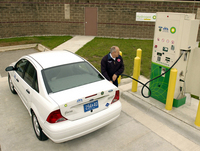Ford and BP Open Hydrogen Station in Taylor, Michigan - Another Milestone in Ford's Hydrogen Roadmap
* Ford, BP and the City of Taylor, Mich., Today Opened a New Hydrogen Station to Fuel Ford Focus Fuel Cells Being Used as Official City Vehicles.
* The four Taylor vehicles are part of a 30 car Ford Focus fuel cell demonstration fleet on the road in the U.S., Canada and Germany.
* Ford Will Begin Deliveries of the Nation's First Hydrogen-Powered Buses Later This Year.
TAYLOR, MI - October 18, 2006: Ford Motor Company, BP and the City of Taylor today marked an important milestone in their collective path towards a hydrogen economy, opening a new hydrogen station that will fuel a fleet of Ford Focus fuel cell vehicles.
"The opening of this station represents a step forward for hydrogen as a motor fuel," said Gerhard Schmidt, vice president, research & advanced engineering, Ford Motor Company. "We have made much progress in hydrogen propulsion over the past 15 years and this is another excellent milestone to commemorate."
Research into hydrogen, including partnering to begin to build an infrastructure, is part of Ford's overall efforts to address the challenges of climate change and energy independence. Ford is moving ahead with a range of technological solutions simultaneously, including vehicles such as the Ford Escape Hybrid and Mercury Mariner Hybrid, hydrogen fuel cells, hydrogen internal combustion engines, ethanol, clean diesel and refinements to gasoline based powertrains and advanced transmissions. Some of the technologies represent near term solutions. Others, such as hydrogen, must be viewed as long term options.
Ford and BP officials were joined today by Rep. John D. Dingell (D-Mich), a ranking member of the House committee Energy and Commerce. "Hydrogen holds tremendous promise. The innovative minds at Ford are listening to the American consumer and working to develop energy efficient vehicles," Dingell said. "With BP providing hydrogen fuel, this event will provide a chance to see the future, right now."
"BP is committed to developing cleaner fuels," said Maria Curry-Nkansah, BP's hydrogen business development manager. "With this station, we will continue our work to gain real-world experience in hydrogen fueling infrastructure and help build public awareness of this developing technology. This program is an example of how government, energy companies and the auto industry are working collaboratively to develop alternative fuels."
Taylor Mayor Cameron G. Priebe, whose city is using four of the Ford Focus fuel cells as fulltime city vehicles, praised the partnership with Ford and BP. "Through the use of hydrogen and other alternative fuels, we can reduce our nation's dependency on foreign oil. In addition, technology related to the development and use of alternative fuels can lead to job creation here in Michigan and add to our state's tax base."
Hydrogen Part of a Broader Effort
Ford first began working on hydrogen technology in the early 1990s. Ford's first hydrogen internal combustion engine demonstration vehicle, released in 2001, was based on a lightweight aluminum sedan body, which also was used in the development of the company's first drivable hydrogen fuel cell vehicle.
The company currently has a fleet of 30 hydrogen powered Focus fuel cell vehicles on the road as part of a worldwide, seven-city program to conduct real world testing of fuel cell technology. The fleet has accumulated more than 300,000 miles since its inception. With this fleet on the ground, a great deal of information is being generated in different local environmental conditions that can be integrated into future fuel cell vehicle propulsion systems.
Having the fleet outside the confines of Ford Motor Company also has allowed the team to gain valuable feedback on servicing vehicles in the field. As a hydrogen infrastructure is developed and implemented for the fleet at each of its locations, lessons learned are being generated to insure that the customer and hydrogen fueling interface is seamless and customer friendly.
Ford and BP Alliance
Ford and BP are both committed to being good corporate citizens, working towards improving issues that contribute to climate change and air quality. Both companies share a firm belief that "Energy and Car" working together, rather than independently, can develop better products to satisfy our customers' want for responsible, personal mobility. By leveraging each other's resources, both Ford and BP can deliver products to market that achieve this objective faster, and additionally, can be optimized to perform better together.
BP is working with DOE and its automotive partners to develop hydrogen fuel stations in Michigan, Florida and California. BP also is involved in refueling infrastructure to support fuel cell buses and cars in a number of cities across the world.
BP produces 5,000 tons of hydrogen per day and is a key player in hydrogen demonstration projects across the globe. More information is available at www.bp.com/hydrogen.



